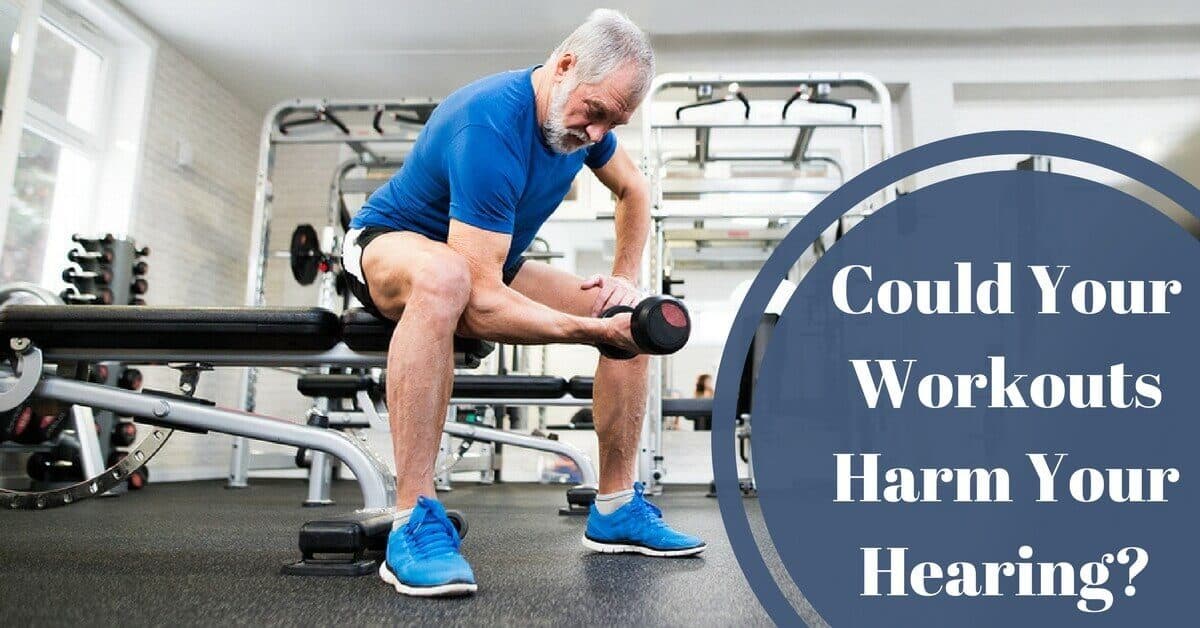We’ve all welcomed the extra push of the right song in the last few minutes of a workout. Whether it’s the beat or the encouraging lyrics, music and exercise tend to go hand in hand these days, especially with smaller personal electronic devices and convenient earbuds. In group classes, a great soundtrack does a lot to motivate you and your fellow classmates to push through to the end. However, studies show that music at fitness classes could put your hearing at risk. Learn more about the danger of loud music at the gym and noise-induced hearing loss.
Study: Classes at Fitness Centers Could Harm Your Hearing
Studies conducted by George Mason University in Virginia show that music played during spin class at various fitness centers in the US could reach seriously dangerous decibel levels, in the 100 to 110 range. To put this into context, a live rock concert tends averages at 120 decibels – and that tends to be at a large venue. In the smaller space of a fitness class, 100 to 110 decibels can do a lot of damage.
For people taking classes at fitness centers or gyms, the exposure to loud music could last about an hour – the length of a class. While this level of exposure could be harmful for students, instructors must pay even more attention. Many instructors teach multiple classes at fitness centers or gyms, increasing the amount of exposure to loud sounds. Hearing specialists tell us that sounds at 85 decibels or louder, with more than an hour of exposure, could potentially lead to permanent noise-induced hearing loss.
According to Dr. Leslie Stengert of Indiana University, “When we see sounds at 99 dB or above for more than an hour on a regular basis, there’s a very high risk of hearing loss. Once it’s gone, you’re not getting it back.”
Noise-induced hearing loss occurs when we are exposed to loud sounds for an extended period of time. Dangerously loud sounds could potentially damage your inner ear hair cells, which do not regenerate. These cells are responsible for translating sound vibrations into neural signals, which are registered by the brain as sound. The damage and loss of inner ear hair cells could lead to noise-induced hearing loss, a form of sensorineural hearing loss.
And, it’s not just the music you hear at classes in the gym. Many people who exercise solo use earbuds, connected to a smartphone or iPod. Earbuds are convenient for exercise, due to their light and flexible design. However, their proximity to your eardrums create dangerous noise conditions, especially if you turn up the volume over 60%. Hearing specialists recommend that you turn down the volume on your earbuds – or switch to noise-canceling headphones, if possible.
Guidelines for Safe Hearing at Fitness Centers
In response to the risk for hearing loss posed by loud sounds at fitness centers, the US Department of Labor’s Occupational Safety and Health Administration (OSHA) has recently issued recommended guidelines for sound levels at fitness centers.
Based on research from hearing professionals, the acceptable threshold for sound is 85 decibels for 45 minutes. As the decibels rise, the time of exposure falls in terms of safe exposure. For example, when volumes increase to 88 decibels, the amount of exposure time drops to 23 minutes. At 117 decibels, exposure of more than 1.7 seconds is unsafe.
If a workout lasts about an hour, and the music levels in a gym could rise up to 120 decibels – the potential for hearing damage is clear! Consider wearing earplugs to the gym. You may also want to discuss your concerns with the instructor or manager of your gym. There’s no reason to cut the music and work out in silence – but if you are concerned about your hearing, it may help to turn down the volume.
Keep Exercising – It’s Good for Your Hearing Health!
Did you know that exercise is good for your hearing health? According to the American Speech Language Hearing Association (ASHA), there is a strong correlation between your cardiovascular health and your hearing health. Your inner ear environment is a sensitive combination of hair cells and tiny blood vessels that require healthy oxygen flow to function properly. When people experience cardiovascular issues, such as heart disease or high blood pressure, the sense of hearing can be adversely affected. If blood flow is constricted to this area, then the cells will not function properly, thereby hindering the auditory process.
Just make sure that you are protecting your hearing while you work out! For more information on healthy hearing practices, or to schedule a hearing test, contact us at one of our My Hearing Centers locations today.


